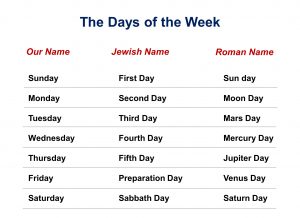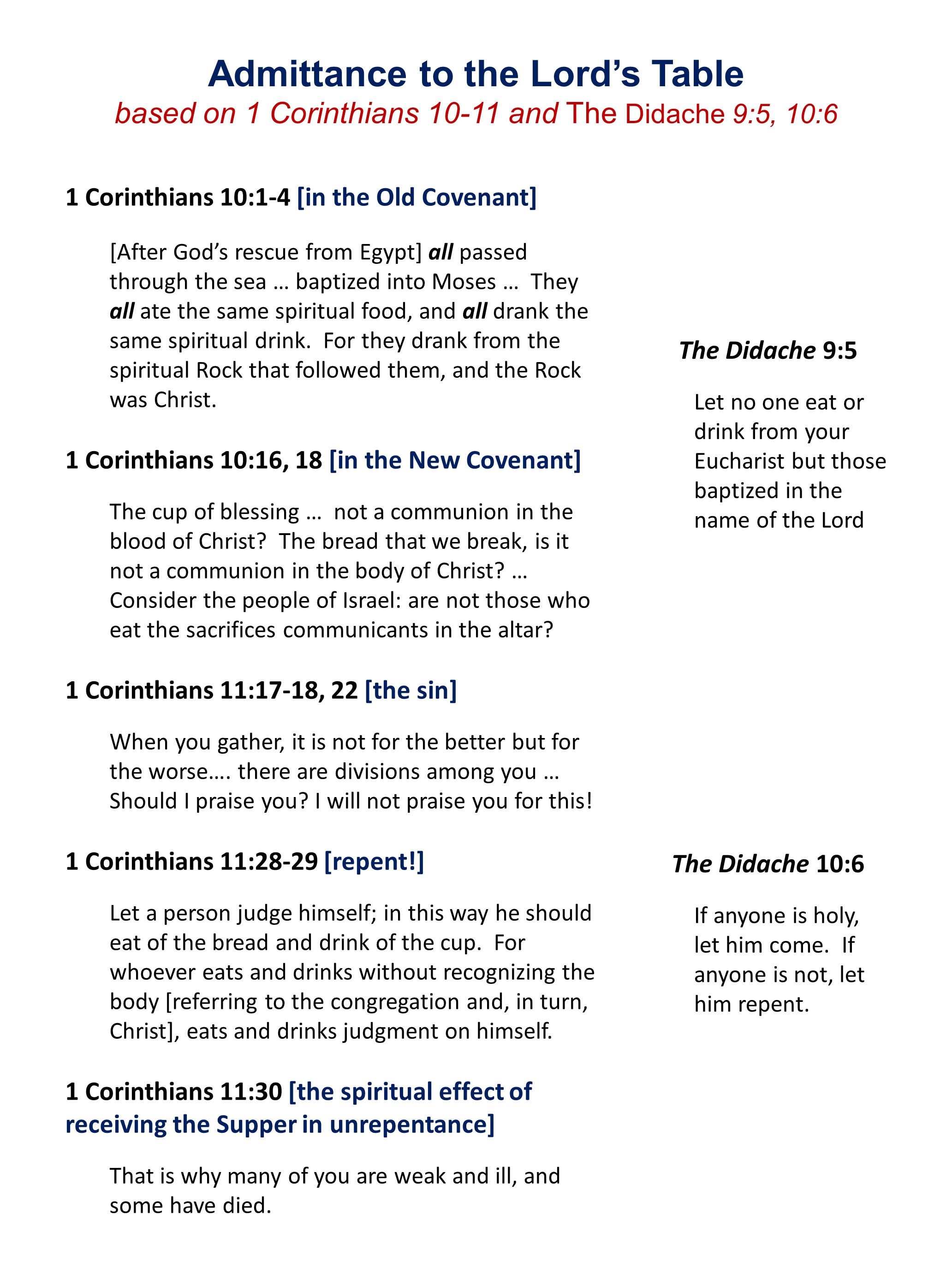The Didache now moves into what brings someone into the community (communion) of Christ: Baptism.
7:1 As for baptism, baptize in this way: After explaining all these things, baptize in the name of the Father and the Son and the Holy Spirit in living [moving, running] water. 2 But if you do not have living water, baptize in other water. And if you do not have cold water, then use warm water. 3 But if you have neither, pour water on the head three times in the name of the Father and the Son and the Holy Spirit.
“living water”: Moving water, as a symbol of life. Jesus speaks of the water He gives as a “spring of water welling up to eternal life” (John 4:14). For the one who believes in Him, “rivers of living water [will] flow from deep within him” (John 7:38).
Life and movement go together. Someone who is alive moves and breathes; someone who is dead does not. Moving water testifies to the movement of life. Though Jesus did not command living water for baptism, it’s easy to see why the Didache teaches to use living water. Living, moving water testifies to the life that God gives in baptism (John 3:3, 5).
Spiritual Disciplines
Fasting
8:1 Don’t let your fasting coincide with those of the hypocrites. They fast on the 2nd [Monday] and 5th [Thursday] days of the week. So, you should fast on the 4th day [Wednesday] and the preparation [Friday] day of the week.
- Who are “the hypocrites”?
- What does calling Friday “the preparation day,” reveal about the writers and date of The Didache?
 The Pharisees fasted twice a week, on the 2nd (Monday) and 5th day (Thursday) of the week. This went far beyond the required annual fast on the Day of Atonement (Leviticus 23:26-32; Acts 27:9) and the fasting times mentioned in Zechariah 8:19.
The Pharisees fasted twice a week, on the 2nd (Monday) and 5th day (Thursday) of the week. This went far beyond the required annual fast on the Day of Atonement (Leviticus 23:26-32; Acts 27:9) and the fasting times mentioned in Zechariah 8:19.
Matthew 6:16:
[Jesus speaking,] “Whenever you fast, don’t be gloomy like the hypocrites, because they put on sad faces, so their fasting is apparent to others.”
A Christian fasts because he wants–in Christ–to deny the demonic powers domination over his fleshly desires, depriving Satan to use his loss of control as an entry point into his life. This is a form of Christian discipline the Christian Church has recognized since the beginning. By telling his flesh, “no,” the Christian learns to tell his fallen flesh, “You’re not the boss of me, Jesus is!”
Prayer
8:2 But do not pray as the hypocrites, just as the Lord commanded in His Gospel. Pray in this way:
Our Father in heaven, hallowed be your name. Your kingdom come, your will be done, on earth as it is in heaven. Give us this day our daily bread, and forgive us our debt, as we also have forgiven our debtors. And lead us not into temptation, but deliver us from evil. For Yours are the power and the glory forever.
3 Pray this three times a day.
Here, The Didache replaces the “Eighteen Benedictions,” the customary Jewish practice, with the Lord’s Prayer. We also find the doxology (praise to God) added at the end: “For yours are the power and the glory forever.” Though not part of the Lord’s Prayer, this liturgical usage concluded the Lord’s Prayer with a doxology. In the Lutheran tradition, the pastor chants the Lord’s Prayer, and the congregation responds by chanting the doxology during the Lord’s Supper liturgy.
Matthew 6:5-6:
[Jesus speaking,] “Whenever you pray, do not be like the hypocrites, because they love to pray standing in the synagogues and on the street corners to be seen by others. I assure you: They have their reward! But when you pray, go into your room, close the door, and pray to your Father in secret, for your Father who sees in secret will reward you.”
- If someone prays the Lord’s Prayer alone, in his room, how can he pray, “Our Father,” without lying? Who else must be praying with him?
The Eucharist
9:1 Now, concerning the Eucharist [thanksgiving], give thanks in this way. 2 First, concerning the cup:
We thank you, our Father, for the holy vine of David, Your Son, whom you have made known to us through Jesus, Your Son. To You be the glory forever.
3 And concerning the broken bread:
We thank you, our Father, for the life and knowledge that you have made known to us through Jesus, Your Son. To You be the glory forever.
4 As this broken [bread] was once scattered over the hills [as grain], and, after being gathered together, became one, so may Your Church be gathered together from the ends of the earth into Your kingdom. To You be the glory and the power forever.
“Eucharist”: From the Greek word for “thanksgiving.” This is a part used to describe the whole, the thanksgiving during the Lord’s Supper comes to describe the entire event. At the first Lord’s Supper, Jesus “gave thanks,” “eucharistized” (Matthew 26:27; 1 Corinthians 11:24). The Eucharist came to replace the earlier term, “The breaking of bread.”
“vine”: Vine also was a term used to refer to the product of the vine: wine.
- The Didache now covers what to expect during the Divine Service. However, it leaves out most of the service! By only mentioning the Lord’s Supper, what does The Didache imply?
- How does The Didache teach Jesus’ “real presence” in the Supper for those with eyes to see?
- How does the bread of the Eucharist testify to the oneness we have in Christ?
9:5 Let no one eat or drink from your Eucharist but those baptized in the name of the Lord.
- What is it that allows one to the Table of our Lord?
- Today, what is different in the Church, which complicates who may receive the Supper at a given location?
10:6 If anyone is holy, let him come. If anyone is not, let him repent.
- Whom does The Didache bar from the Supper?
Holiness describes what is set apart for worship. To treat something holy as something common is to profane them (See Exodus 29:37, Leviticus 22:10-16). Jesus also teaches this in the New Covenant (Matthew 7:6). The early Church applied this practice to the Supper in The Didache but never suggested not to receive Communion, but to repent before receiving.
Keeping What Christ Gave His Apostles
11:1 So, if someone should come to you and teach all that was earlier taught, receive him. 2 But if the teacher has turned away, teaching another doctrine, destroying this teaching, do not listen to him. However, if his teaching brings one into the Lord’s righteousness and knowledge, receive him as the Lord!
Galatians 1:9:
As we [Paul and His brother pastors] have said before, I now say again: If anyone proclaims to you a gospel contrary to what you received, a curse be on him!
2 Thessalonians 2:15:
So then, brothers, stand firm and hold to the traditions we passed on [“traditioned”] to you, whether by what we said or what we wrote.
- What does The Didache teach about retaining what was passed on to them?
- How does what a pastor teaches and preaches shape how a congregation is to treat him?
13:1 Every true prophet [the one who is called to speak God’s Word] willing to settle down among you is worthy of his food. 2 A true teacher is also, like a worker, worthy of his food. 3 So then, you are to take the first fruits of vintage and harvest, of cattle and sheep, to the prophets, for they are your high priests. 4 But if you do not have a prophet, give it to the poor. 5 If you bake bread, take the first fruits according to the commandment. 6 Likewise, when you open a jar of wine or oil, take the first fruits and give it to the prophets. As for money, clothing, or any other possession, take the first fruits, as seems good to you and give according to the commandment.
- What does this section deal with?
1 Corinthians 9:14:
The Lord has commanded that those who preach the gospel should earn their living by the gospel.
- What the bread, wine, and oil? Why does the Church need those items?
Bishops and Deacons
15:1 So then, appoint yourselves bishops [overseers], as well as deacons [assistants], who are worthy of the Lord: Men who are gentle, not lovers of money, truthful, and tested. For, among you, they likewise carry out the service [literally, “liturgize the liturgy”] of the prophet-teachers.
- This list is shorter than Paul’s to Pastors Timothy (1 Timothy 3:1-10, 12-13) and Titus (Titus 1:5-9). What does The Didache imply by having the same requirements levied on both?
15:2 That is why you are not to disrespect them, for they are your honored ones with the prophet-teachers.
Hebrews 13:17:
Obey your leaders and submit to them, for they keep watch over you and will have to give an account. Do this so that their work will be a joy, not a burden, for that would be of no benefit to you.
- Discuss the pastor-congregation relationship.
15:3 Also, correct one another, not in anger, but in peace, just as you find it in the Gospel [Matthew 18]. 4 And do your prayer, alms, and all your actions as you have it in the Gospel [Matthew 6] of the Lord.
- How does the term “the Gospel” testify to an early date for The Didache?
- What is the point of correcting a brother?
Christ’s Return on the Last Day
16:1 Watch over your life. Don’t let your lamps go out and don’t let your loins be ungirded. Instead, be ready, for you don’t know the hour when our Lord is coming. 2 Gather together often, seeking what pertains to your souls. For the time you have believed will be of no benefit if, on the Last Day, you are not made complete.
- “Gather together often” refers to what? (see Hebrews 10:25)
- “The time you have believed will be of no benefit if, on the Last Day, you are not made complete” means what can happen to someone’s salvation?
16:6 And then the signs of the truth will appear: The first sign, the opening of heaven; the next sign, the sound of the trumpet; and the third, the resurrection of the dead. 7 Yet, not all [will be saved]. As it was said, “The Lord will come and all the saints with Him” [Zechariah 14:5].
Why The Didache Matters
The Didache is a small but revealing document from the earlier period of the New-Covenant church, of which we are largely ignorant. Apart from helping us answer some questions we may have, it also provides a worldview of the Christian Church. Even now, we stand on the brink of the world to come, eager for our returning Savior, to whom we look with joy. Aware of our lives as we anticipate His coming, we navigate between the light and darkness, life and death.




